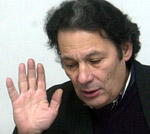One of my acquaintances decided to open his own business after years of working in fuel distribution and founded a real estate agency. He saw me once and invited me to his newly opened office, where a long-legged girl with a short skirt, straight from the “glamour” magazines, opened the door.
“She is our psychologist,” my acquaintance said.
“Why do you need a psychologist?” I asked surprised.
“What do you mean?” he asked amazed.
“I mean, what is this girl doing as a psychologist?”
“She has an impact on the clients,” he said assuredly.
“Oh,” I said, pretending to understand how she is going to have an impact on the “clients”.
I would hardly remember this story if it weren’t for the father of Armenian sociology, Aharon Adibekyan, and the publication of his impressions of the survey in Karabakh. Frankly, I don’t really know any of the presidential candidates of the Republic of Nagorno-Karabakh. I hadn’t even heard of the names of the frontrunners Bako Sahakyan (National Security Service head), and Masis Mailyan (deputy foreign minister), up until the nomination. I am not saying this in order to show that I have no special leanings towards anyone in particular, rather because I have not heard any other names besides “Robik”, “Serzhik” and “Arkadik” after being in Karabakh several times, and having had contact with many average citizens of Karabakh. I haven’t even heard of the other three candidates. I say this so that I can ask the father of Armenian sociology which of the manifestations of the first two candidates have served as an occasion to consider one of them as “glamorous” and the other as the “father”.
I think that both of them have worked carefully in their positions. Both of the positions – the National Security Service and the Ministry of Foreign Affairs – are closed structures, and neither of the candidates has made daily public speeches nor revealed his endeavors. Upon registering as presidential candidates, they have probably given some interviews to non-widespread newspapers and the Artsakh state television, which rarely give the serious people of Karabakh the chance to come to any thought-out conclusions.
If one of the candidates were, let’s say, former Defense Minister-turned head of main headquarters of the RA Ministry of Defense, Seyran Ohanyan, or another top-ranking soldier who has fought in the war, perhaps I would believe in the “father” formulation of Aharon Adibekyan, because the army of Karabakh is truly respected and is considered a reliable protector and patron. Perhaps I would believe it, yet with certain doubts because the “father” formulation is not familiar to the Karabakh public. Victorious and adamant, each one of them is already a “father” and doesn’t feel the need for a “father”, much less a caring, generous “father” who cares about everybody. Victorious and adamant, each one of them wants to see someone who guarantees to be the “father” and not someone who, according to Aharon Adibekyan, has provided financial aid to the people.
This sociology is very dangerous; that is, of course, if sociology can be dangerous or helpful for that matter. So, on the one hand, the “popular” survey describes as “glamour”, a word unknown to 99% of the population of Karabakh, the attributes of being educated, smart, and learned as qualities of a presidential candidate, and on the other hand, idolizes the person that has held state offices as the benefactor. But even this is not the most dangerous thing, rather that sociology turns the electorate into an adolescent looking up to the “father”, the adolescent whose right to live is limited by the goodwill of the local prince.
Thank God that I am not a sociologist and communicate with people directly and not through other technologies. I may not communicate with 700 people, but the people I meet are enough for me to deduce what the average or middle-class citizen of Karabakh wants. You may get bored by hearing the same words over and over – “Everything will be fine if there are jobs”. You hear these words all over the regions of Karabakh.
We can assuredly say that jobs, working, and a dignified life are the demands for all rational human beings, and the people of Karabakh are no exception. When it comes time to choose a leader, they obviously have to be guided by the main demands. When are the candidates going to talk about issues concerning employment and welfare so that the people surveyed may deduce something? I don’ know what the geography of the 700 people surveyed was, but I think that it has not stepped out of the framework of the functionaries of Stepanakert. It is within that framework that they think a job is the payroll from the state budget and the welfare of the people is to run off with something from the state budget. If the survey was taken within this framework, then the tendency of seeing the future president as the “father” is precise. Who else can secure the “swelling” of those that are nourished by the state budget? Who else can allow ministerial departments to have more workers than those in the villages? As far as I know, sociology registers the mood of the public, if the “client” feels the need to get acquainted with that disposition, but in this case the sociologist is trying to have an impact just like the psychologist mentioned earlier with her short skirt, long legs and flirting eyes. In any case, the inventory remains motionless…until the new elections.

